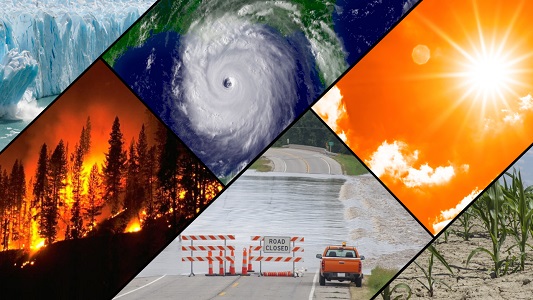By Olusegun Folarin Ogun State Government has expressed its readiness to collaborate with relevant bodies, especially Tertiary institutions to explore opportunities in mitigating the challenge of climate change. The Permanent Secretary, Ministry of Physical Planning and Urban Development, Mr Continue Reading
Olusegun Folarin To prevent further loss of investments in yam production, farmers and Agricultural Extension workers in Ogun State have committed themselves to promoting wholesome practices to overcome the challenges of yam cultivation. They made the submission in Abeokuta at a training programme organised by the Federal Ministry of Agriculture and Rural Development to Continue Reading
By Mosope Kehinde Climate change in Nigeria is one major challenge that has become a great concern to stakeholders. In this special report, our reporter, Mosope Kehinde takes a look at the impact of human behaviours on climate change in Nigeria. No doubt, both human and animals, not leaving out all the sectors of Nigeria’s […]Continue Reading
The billionaire founder of the outdoor fashion retailer Patagonia says he has given away his company to a charitable trust. Yvon Chouinard said that under a new ownership structure, any profit not reinvested in running the business would go to fighting climate change. This will amount to around $100m a year, he claimed, depending on […]Continue Reading
Researchers from the Federal University of Agriculture, Abeokuta have commenced sensitization for farmers on the climate information services for early warning system on climate change in the southwest. The unveiling of the research work aimed at assisting farmers to prepare against the impacts of climate change held in Abeokuta was attended by stakeholders from the […]Continue Reading
Ajo ton risi oro ayipada oju ojo nileyi, NIMET ti kesi awon eni orokan leka eto ogbin nipinle ogun lori lilo anfani awon ikede ajo naa lori boju ojo seleri fun eto ogbin ohun ise agbe lapapo. Eekan awosakun oju ojo lati ajo ohun, Ogbeni Charles Olubiyi lo soro iyanju naa nilu abeokuta lasiko eto […]Continue Reading
Àarẹ Muhamadu Buhari nìrètí wàpé yóò sọ̀rọ̀ lọ́la-òde yíì níbi àpàdé àpérò àyípadá ojú-ọjọ́ àti ìpàdé àláfìa ní Glasgow, Scotland. Àarẹ yóò sọ̀rọ̀ lórí àwọn ìpinu ilẹ̀ yíì láti gbógunti àyípadà ojú-ọjọ́ tófimọ́ síse àseyọrí àfẹnukò ojú-ọjọ́ ilẹ̀ pari. Olùranlọ́wọ́ àgbà pàtàkì sáàrẹ fọ́rọ̀ ìròyìn àti ìbáráàlù-sọ́ọ̀rọ̀, Mallam Garba Shehu sọ èyí nínú àtẹ̀jáde ninu […]Continue Reading
Global warming is causing long-lasting changes to our climate system which threatens irreversible consequences. According to the United Nations Intergovernmental Panel on Climate Change, the world must cut its carbon dioxide emissions to net zero by 2050 in order to prevent global warming. Also, the Nigeria Meteorological Agency, NIMET, in its 2019 seasonal rainfall Continue Reading
